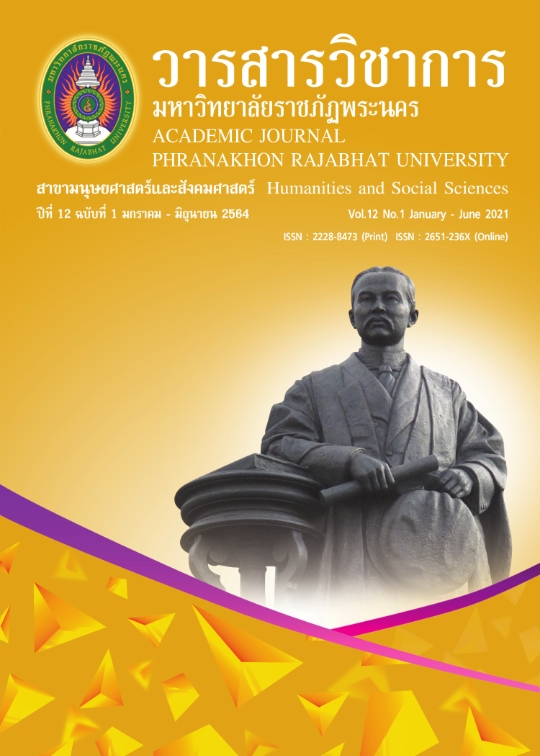DEVELOPING THAI PHUAN COMMUNITY NETWORK, PAK PHLI DISTRICT, NAKHON NAYOK PROVINCE
Keywords:
Keywords: Model, Development, Network, Thai Phuan CommunityAbstract
This research aimed to study 1) The effectiveness of the management of Thai Phuan Community network 2) A model of the management of Thai Phuan community network, Pak Phli district, Nakhon Nayaok province. The research utilized the mixed methods of qualitative and quantitative. For the qualitative methodology, the tool used was the interview with 21 key informants. The obtained data was analyzed with study point analysis. For the quantitative methodology, the tool was questionnaires asking 400 villagers of Ko Wai sub-district, Pak Phli district, Nakhon Nayok province. Statistics used were frequency, percentage, mean, standard deviation and Pearson’s Correlation Coefficient.
Research results: 1) The management of Thai Phuan community network was found at high level (=4.13) The villagers were found to use local dialect in communication. The community is living in harmony and helping each other. 2) The factors helping in the success of the management of Thai Phuan community network were found at high level (=4.12) Various activities were implemented to continuously promote the network. Social issues were raised in the network so the villagers helped in finding proper solutions. Other crucial factors were: good leadership; clear allocation of tasks; systematic planning for the network; encouraging the participation from the community to help preserve Thai Phuan culture and tradition. 3) A proper model for the management of Thai Phuan community network, Pak Phli district, Nakhon Nayok province, was found in this study. The local community has united in solving problems of the community and surveying the need of the villagers. They are working together to find proper solutions to all problems. They set clear plans for actions including problem analysis; planning; monitoring and follow-up. They aimed to strengthen their Thai Phuan community for the sustainable development.
References
Agranoff & McGuire. (2003). “Big Questions in Public Network Management Research.” Journal of Public Administration Research and Theory. 11,3: 295-326.
Apakro, M. S. (2004). Network: Nature, Knowledge and Management. Bangkok: Promotion of Learning for Happiness Community (SorSorSor). (in Thai)
Bunthaya, R. (2005). Community-Based Development: Experts from working in 10 years of villagers for northeastern development. Khon Kaen: Khon Kaen University. (in Thai)
Charoenwongsak, K. (2000). Network Management: Key Strategies for the Success of Educational Reform. Bangkok: Institute of Future Studies for Development. (in Thai)
Chiangkul, W. (2007.) Community Development - Social Development. Chiang Mai: Faculty of Social Sciences, University. Chiang Mai. (in Thai)
Frederickson, G.H. (1999). The Repositioning of American Public Administration. PS: Political Science and Politices, 32(4).
Gordon. (1996). A Diagnostic Approach to Organization Behavior. 6th ed. Boston: np.
Khumkhai Nam, T. (2014). Community development. Education and Rural Development. Khon Kaen: Siripan Offset. (in Thai)
Kitikirati, J.C. (2009). Community Development: People Participation in Community Development. Bangkok: Mr. Pin Aksornkit. (in Thai)
Kruithep, W. (2007). Network: Innovation of local government organization. Bangkok: Research Fund Office. (in Thai)
Mallikamarn, S. & Kanjanawat, N. (2000). Public participation in community waste management. Bangkok: Health System Research Institute. (in Thai)
Office for strengthening the community (1999). Development of Sufficiency Economy Village for Create happiness for the community. Bangkok: Department of Community Development. (in Thai)
Puangngam, K. (2002). Strengthening the community. Bangkok: Winyuchon. (in Thai)
Sangsri, W. (2009). Study, Analysis and Development of Network Management Model. Educational institutions in the rural areas of the Northeast. Ph.D. Thesis, Bangkok: Chulalongkorn University. (in Thai)
Sarawongsuwan, J.(2005). Development of indicators and models of cause and effect of collaboration among primary school teachers. Phra Nakhon Si Ayutthaya Province Doctor of Education Thesis, Program in Educational Research Methods. Chulalongkorn University. (in Thai)
Sekuchi, T.P. (2011). Public administration in the form of a network: a case study of community organization development institute. Office of the Southern Region Master's Thesis, Bangkok: Ramkhamhaeng University. (in Thai)
Sirasunthorn, P. (2013). Concepts, Theories, Techniques and Applications for Social Development. Bangkok: Chulalongkorn University. (in Thai)
Srikatanyu, R. (2008). Motivation factors in work. Working atmosphere and commitment to the organization Master's thesis Srinakharinwirot University. (in Thai)
Sunyawiwat, S. (2007). Community development. 2nd edition. Bangkok: Thai Wattana Panich. (in Thai)
Suwanatchariya, C. (2006). Social network. Mahasarakham: Mahasarakham University. (in Thai)
Techarin, P. (2014). Policy and Strategies for Community Participation in the Current Development Strategy of Thailand. In the participation of people in the development. Bangkok: Saksopa Publishing. (in Thai)
Wattanasiritham, P. (2014). Powerful ordinary people. Bangkok: The printer of the month disposal. (in Thai)
Wesaratch, P. (2011). Principles of educational management. Bangkok: Photo prints. (in Thai)
Yodming, Jarin. (2017). A study of Thai history. Pion for community based tourism management that Suiable for the context of Koh Wai Sub-district, Amphur Pak Phli, Nakhon Nayok Province Bangkok: Office Research Fund. (in Thai)
Downloads
Published
How to Cite
Issue
Section
License
"บทความวิชาการในวารสารฉบับนี้ ถือเป็นความรับผิดชอบของผู้เขียนเท่านั้น"
สงวนลิขสิทธิ์ตามพระราชบัญญัติลิขสิทธิ์




